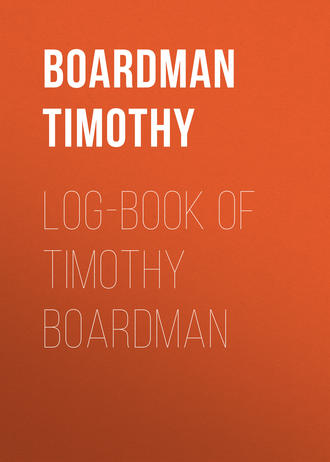 полная версия
полная версияLog-book of Timothy Boardman
In social and domestic life, he was a son of the Puritans and of the Connecticut type. He exacted obedience, and somewhat of reverence from his children. They did not dare, to the last, to treat him with unrestrained familiarity. His wife and children stood, waiting at their chairs, until he was first seated at the table. He gave his children a good education for the time, sending them to “Master Southard.” His habitual temper of mind was one of deep reverence toward God. He sat in awe during a thunder storm, and a cyclone which passed over his home deeply impressed him. His letters abound in affectionate and in religious sentiments. He was scrupulous in the observance of the Sabbath; required it of his children, and he expected it of the stranger within his gates. The family altar probably never failed from the day he first entered with his newly married wife, into their pioneer home, amid the forests, till his death. He was solemn, earnest and felicitous in prayer. The atmosphere of his home was eminently that of a christian household. Two of his four sons became officers in their churches, and also both his sons-in-law. Four of his grandsons entered the Christian ministry, and a granddaughter is the wife of a clergyman. Those who regard the Puritans in general, as too severe in industry, in frugality, in morals and in religious exercises, would have regarded him as too exacting in all these directions. He certainly could not on one hundred and fifty acres of land, which he found wild, and not all of it very good, have reared a large family, and supported public institutions as he did; have given each of his sons at settlement in life, six hundred dollars, and left to each at his death, eight hundred, if he had not practiced through life, a resolute industry, and a somewhat rigid economy.
It is worthy of notice that like his grandfather, Timothy Boardman of Wethersfield, he owned, what by a little change of circumstances, might have brought, not a competence merely but wealth to his heirs. Early in his residence at Rutland, he became possessed, with many others of a small lot in what was called the “Cedar Swamp.” These lots were valued almost exclusively for the enduring material for fences which they afforded. Their cedar posts supplied the town. They obtained also on the rocky portions of these lands a white sand, which was employed for scouring purposes, and also for sprinkling, by way of ornamentation, according to the fashion of the times, the faultlessly clean, white floors of the “spare rooms.” Timothy Boardman’s cedar lot, is now one of the largest marble quarries in Rutland, a town which is said to furnish one-half of all the marble produced in the United States. It brought to one of his sons, a handsome addition to farm profits, but was disposed of just before its great value was appreciated and lost, as in case of the Maine lands.
His grandfather Timothy Boardman, is said to have been “a short, stocky man;” his monument, and until recently that of his father Daniel, son of the emigrant from England, might both be seen, near together in the old cemetery at Wethersfield.
The author of the Log-Book, was a little below the average height, of rather full face, with a peach-bloom tinge of red on each cheek in old age, and of light complexion, and light hair. His motions were quick, and his constitution healthful, though he was never strong. He had undoubtedly a mind of fair ability; inclined perhaps to conservative views, and acting as spontaneously, it may be in criticism, as in any other exercise of its energies. I remember to have received reproof and instruction in manners, from him when I was five or six years of age. He was careful of his possessions, and articles belonging to him, were very generally marked “T. B.”
It is a tradition among the older kindred, that the writer, though he does not remember it, finding at the age of five or six, on grandpa’s premises, some loose tufts of scattered wool, and being told that they were his, expressed the candid judgment, that it could not be so, “because they were not marked T. B.”
I am not aware that he was much given to humor, yet he would seem not to have been entirely destitute of it from the philosophical account he gave of the advantages of his position, when some one ventured to condole with him on the steep hill of nearly a mile which lay between his house and the church. He said it afforded him two privileges, first that of dropping down quickly to meeting, when he had a late start; and secondly, that of abundant time for reflection on the sermon while he was going home.
His wife, undoubtedly his equal in every respect, to whom much of his prosperity, usefulness, and good repute, as well as that of his family was due, after a married life of fifty-three years and three months, died in Dec., 1836. She had long been feeble. Her children watched around her bedside on the last night in silence till one of her sons, laying his hand upon her heart, and finding it still, said “we have no longer a mother.” I remember the hush of the next morning, throughout the house, when we young children awoke. It was lonely and cold in grandma’s room, and only a white sheet covered a silent form.
At eighty-three he was alone, and he deeply felt, as was natural, that loneliness. Yet he had affectionate children, and with his youngest son, who had four daughters, to him kind and pleasant granddaughters, he made his home for the remainder of his life. With the oldest of these he made in 1837, as already noticed, his last visit to Connecticut, going as far as New Haven and the city of New York. On this journey he went in his own carriage. He visited us, once at least in Castleton, at the house where the Log-Book was so long concealed. I remember his figure there, as that of a “short and stocky man,” who seemed to me very old. He died while on a visit to Middlebury, where two of his children had been settled for more than twenty years, at the house of his youngest daughter and youngest child, Betsey, then the widow of Dea. Martin Foot. She and her six daughters did everything possible for his comfort. A swelling made its appearance upon his shoulder, and the disease advanced steadily to a fatal termination. His appointed time had come. From his death-bed he sent to his children a final letter of affectionate greeting and counsel. The feeble hand, whose lines had been so fair and even for nearly three-quarters of a century, wanders unsteadily across the pages, expressive of a mind perhaps already wandering with disease. And so the fingers that had traced the neat lines of the Log-Book, on board the Oliver Cromwell, in 1778, “forgot” sixty years afterwards “their cunning,” and wrote no more. He was buried beside his wife, in the cemetery at West Rutland, near the church where he had worshipped nearly sixty years.
On the death of his wife, he had ordered two monumental stones to be prepared just alike, except the inscriptions; one of which was to be for her, and the other for himself. They may be seen from the road, by one passing, of bluish stone standing not very far from the fence, and about half way from the northern to the southern side of the lot. On these stones was inscribed at his direction, where they may now be read, the words, contained in Rev. 14: 13, divided between the two stones; on the one: “I heard a voice from heaven saying unto me, write Blessed are the dead, which die in the Lord from henceforth;” and on the other: “Yea saith the Spirit that they may rest from their labors and their works do follow them:”
His children were:
Hannah, born July 23, 1784; died Oct. 26, 1803.
Timothy, born March 11, 1786; settled in Middlebury, and died there April, 1857.
Mary, born Jan. 27, 1788; married Dea. Robert Barney of East Rutland 1824; died at her son’s house, in Wisconsin, 1871.
Dea. Samuel Ward, born Nov. 27, 1789; died in Pittsford, Vt., May 13, 1870.
Dea. Elijah, born March 9, 1792; died Sept. 24, 1873.
Capt. Charles Goodrich, born Feb. 19, 1794; died Dec. 17, 1875.
Betsey, born, 1796; married Dea. Martin Foot of Middlebury; died April 26, 1873.
The proclivity of the Puritans for education is illustrated in the fact, that only five years after the foundation of Yale College one of this family, Daniel a grandson of Samuel, the emigrant from England, became a student there and was graduated in 1709, and that wherever different branches of the family have since been settled they have generally sent sons to the nearest colleges, not only many to Yale, but several to Dartmouth, Williams, Middlebury, Union, and others. The eighth and ninth generations are now in the process of education, in various institutions east and west. The descendants of Timothy Boardman who have entered professional life, are:
Hon. Carlos Boardman (grad. Middlebury College 1842), a lawyer and judge, in Linnaeus, Mo., oldest son of Capt. Charles. G. Boardman, of West Rutland.
Rev. George Nye Boardman, D.D. (Middlebury College 1847). Prof. of Systematic Theology, in Chicago Theological Seminary, Chicago, Ill.
Rev. Samuel W. Boardman, D.D. (Midd. Col., 1851). Pastor of the First Presbyterian Church, Stanhope, N.J.
Rev. Simeon Gilbert Boardman (Midd. Col., 1855). Pastor of the Presbyterian Church, Champlain, N.Y.
Charles Boardman, a member of the class of 1850, in Middlebury College, and who died of typhoid fever in the sophomore year, doubtless had in view the Christian ministry.
These four were sons of Dea. S. W. Boardman, of Castleton.
Horace Elijah Boardman, M.D. (Midd. Col., 1857), in practice at Monroe, Wis., youngest son of Dea. Elijah Boardman, of West Rutland.
Harland S. Boardman M.D., (Midd., 1874), a grandson of Timothy 4th, and son of Timothy 5th, of Middlebury, was graduated at the Homeopathic Hospital College of Cleveland, Ohio, 1877. He is now practicing at Ludlow, Vt.
William Gilbert Boardman, in practice of dentistry in or near Memphis, Tenn., a grandson of Dea. Elijah Boardman.
Edgar William Boardman, M.D., son of Dr. Horace E., now practicing at Janesville, Wis.; both he and his father were graduated at the “Hahneman Medical College and Hospital, of Chicago.”
– Webster, M.D., grandson of Mary, Mrs. Dea. Robert Barney, in practice in Schuylerville, N.Y.
Dea. Martin Foote, the husband of Betsey, was a student in Middlebury College for two years, it is believed, in the distinguished class of 1813, but by reason of impaired health, he was unable to complete the course.
A few words in regard to the Log-Book may not be inappropriate. It seems to be a mere waif that has floated on the current, and among a thousand things that have perished, to have been, as it were by accident, preserved. A portion of the volume seems to be a kind of a private journal kept by my grandfather, for a few weeks in 1778. He does not appear to have valued it greatly, as on the blank leaves, he has made some entries of his business, as town clerk, and some as county surveyor, and afterward, a few notes of account with his son Elijah, who took a part of his farm. His last entry in it, as if it were in part a waste blank book, was made forty-eight years after he left the Oliver Cromwell, in 1826.
It must have come into my father’s hands with some other papers, on the division of his father’s effects in 1839. Both seem to have been reluctant to destroy anything, though they did not much value it. My father, at last, weary of keeping it, would seem to have given it to me merely for its blank pages, as scribbling paper. Six leaves, apparently blank, were torn out. Several pages are covered with mere vacant scrawling by my boyish hand; whether I threw it away in utter contempt, or concealed it back of the old chimney, in curious conjecture whether some unborn generations, would not at some distant day discover it, and puzzle over it, I cannot tell. I have no recollection of it whatever; except that I had a general impression that we used to have more of grandfather’s writings than we possessed in later years. Whether we had still others I know not. How little of such writing survives for a century! It was lost for forty years, till a quarter of a century after we had sold and left the house. It was found in 1884, in a dark recess, back of the chimney, in the garret, by Master Fred. Jones, the son of an esteemed friend, who in her childhood, about the time of the loss of this manuscript, was a member of my father’s household. Many years afterwards, she became the worthy mistress of the house, and this lad, exploring things in general, came across this old Log-Book. If it is of any interest or value; to him and to Dr. J. M. Currier, the accomplished secretary of the Rutland County Historical Society, and to James Brennan, Esq., an old schoolmate who took an interest in the manuscript, is due all the credit of its publication.
JOURNAL OF THE SECOND CRUISE
April 7th the Defence had Five Men Broke out With the Small Pox.
9th they Lost a Man wth the Small Pox.
10th Exersisd Cannon & Musquetry.
11th Saw a Sail the Defence Spoke with her She was a Frenchman from Bourdeaux Bound to the West Indies.
13th Crosd the Tropick Shavd & Duck About 60 Men.
14th at four Oclock Afternoon Saw a Sail Bearing E S E. We Gave Chase to her & Came Up With her at 8 Oclock She was a Large French Ship we Sent the Boat on Board of her She Informed us of two English Ships which She Left Sight of at the time we Saw her.
15th at Day Break We saw two Sail Bareing SEbS Distance 2 Leagues We Gave Chase Under a Moderate Sail at 9 °Clock P. M. Came Up with them they at First Shew French Colours to Decoy us when we Came in About half a Mile of us the Ups with English Colours We had Continental Colours Flying We Engaged the Ship Admiral Kepple as Follows When We Came in About 20 Rods of her We Gave her a Bow Gun She Soon Returned us a Stern Chaise & then a Broad Side of Grape & Round Shot Capt Orders Not to fire till we Can See the white of their Eyes We Got Close Under their Larbard Quarter they Began Another Broad Side & then We Began & held Tuff & Tuff for About 2 Glasses & Then she Struck to Us at the Same time the Defence Engaged the Cyrus who as the Kepple Struck Wore Round Under our Stern We Wore Ship & Gave her a Stern Chase at which She Immediately Struck. The Loss on our Side was One Killd & Six Wounded one Mortally Who Soon Died Our Ship was hulld 9 Times with Six Pound Shott Three of which Went through Our Birth one of which wounded the Boatswains yoeman the Loss on their Side was two Killd & Six wounded their Larbourd quarter was well filld with Shott one Nine Pounder went through her Main Mast. Imployd in the After-noon Takeing out the Men & Maning the Prise The Kepple Mounted 20 Guns 18 Six Pounders & two Wooden Do with about 45 Men, the Cyrus Mounted 16 Six Pounders with 35 Men Letters of Marque Bound from Bristol to Jamaica Laden with Dry Goods Paints & C.
18th Capt Day Died.
19th Capt Brown of The Ship Adml Kepple & Capt Dike of the Cyrus with Three Ladies & 8 Men Sett off in a Long Boat for St Kitts Or Captns Parker & Smedleys Permition.
20th Imployd in taking things out of the Prise Viz. One Chist of Holland a Quantity of Hatts & Shoes Cheeses Porter & Some Crockery Ware Small Arms Pistols Hangers two Brass Barrel Blunderbusses a Quantity of Riggen & C.
21st At Three oClock Afternoon we wore Ship to the Southward The Prises Made Sail to the Northward we Lost Sight of them at Six.
May 2nd Sprung Our Foretopmast Struck it & Shipd Another in its Room.
8th Saw a Sail over Our Starboard bow We Gave Chase to her She was a French Guineaman Bound to the Mole With 612 Slaves on Board Our Capt Put 6 Prisoners on Board of Her Left her Just at Dark.
11th At 5 o’Clock in the Morning Saw a Sail at the Windward two Leagues Distance Bearing Down Upon Us we Lay too for her till She Came in half Gun Shott of us the Man at Mast head Cryd out 4 Sail to the Leeward Our Officers Concluded to Make Sail from her Supposing her to be a Frigate of 36 Guns after we Made Sail We Left as Fast as we wanted She Gave Over Chase at two oClock Afternoon She was the Seaford of 28 Guns.
22nd Sprung our Maintop sail Yard.
28th Made the Land at Port Royal.
29th the Ship Struck Bottom Thrice.
30th Came over the Bar this Morning & Arrivd in this Harbour In Company with the Ship Defence Comed by Samll Smedly. Charlestown, Sth. Cna. May ye 30th 1778.
SAILING DIRECTIONS OF THE SECOND CRUISE
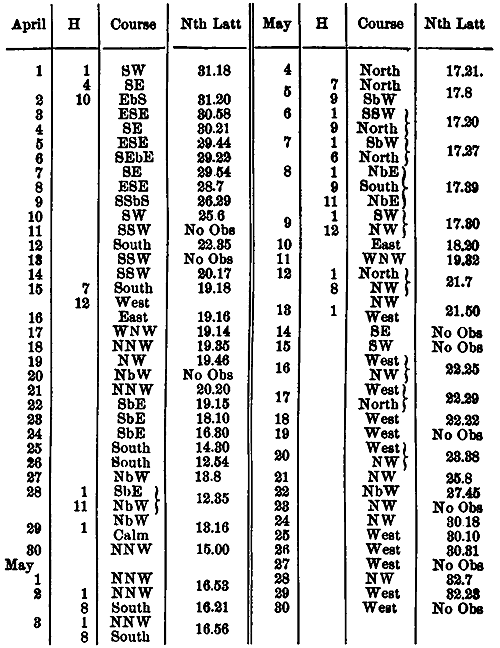
An Account of the Months, Days And Knots Run, by the Ship Oliver Cromwell in her Second Cruise.
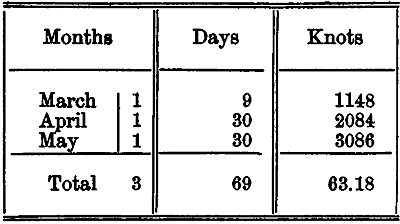
CONTRACT BETWEEN TIMOTHY BOARDMAN AND CAPT. PARKER.
FOR THE THIRD CRUISE
Charlestown, July 6th, 1778.
Conversation Between Capt Parker & My Self this Day.
Pr. What are you Doing a Shore.
My Sf. I wanted to See You Sir.
Pr. Verry well.
My Sf. The Term of my Inlistment is up & I would be glad of a Discharge Sir.
Pr. I cannot Give you One, the Ship is in Distress Plumb has been trying to Get You away.
My Sf. No Sir, I can have Good Wages here & I think it Better than Privatiering I cant Think of Going for a Single Share I had a hard task Last Cruise & they all Left me.
Pr. You have had a hard task of it & I will Consider you. & You Shall have as Much again as You Expect. Ranny & those that Leave me without a Discharge will Never Get anything you Better go aboard Boardman. I will Consider you & you,ll Lose Nothing by it.
My Sf. I am Obligd to you Sir. & So went on Board.
JOURNAL OF THE THIRD CRUISE
July 24 Weighd Anchor at 5 Fathom hole & Came Over the Bar In Compy with the Notredame a 16 Gun Brig & two Sloops. Mett a French Ship of 28 Guns on the Bar Bound in.
25th A Smooth Sea.
29th Saw A Sail Gave Chace.
30th Saw A Sail Gave Chace.
31st Saw two Sail Gave Chace. Light winds.
August 6th at half after Six Afternoon Saw a Sail & Gave Chace, at 11 Gave her a Bow Gun which Brought her too She was a Big from New Orleans in Missippi Bound to Cape Francois a Spainard Went on Board Kept her All Night & Lett her Go at 10 °Clock the Next Day her Cargo was Furr & Lumber She had Some Englismen on Board the Occasion of our Detaining her So Long.
7th At 5 OClock Afternoon Made the Land the Island of Abaco.
8th at 10 °Clock Harbour Island Bore East Dist 2 Leagues.
9th Hard Gales of wind.
10th Fresh Gales of wind & Heavy Squals.
11th Fresh Breeses & a Rough Sea.
12 at Six Afternoon Caught a Great Turtle which was Kookd the Next Day for the Entertainment of the Gentlemen of the Fleet No Less than 13 Came on Board to Dine.
14 At 2 °Clock P M Harbour Island Bore SbW 1 League Dist Sent the Yoll on Shore The Brig Sent her Boat a Shore too.
15th The two Boats Returned with a two Mast Boat & 4 Men Belonging to New Providence Squally Night & Smart Thunder & Lightning.
16th Crosd the Bahama Banks from 8 Fathom of water to 3¾ Came to Anchor at Night on the Bank.
17th Arrivd at the Abimenes Filld our Water Cask & Hoggd Ship & Boot Topt the Ship.
18th At Day Break Weighd Anchor together with the Rice Thumper Fleet at Noon Parted with Them & Fired 13 Guns the Other fir,d their Guns Which was a 16 Gun Brigg the Notredame Command by Capt Hall A 10 Gun Sloop Comd by Capt Robberts A 12 Gun Sloop Comd by John Crappo or Petweet & Stood to the westward a crossd the Gulf.
19th at Day the Cape of Floriday bore west we stood for it a Crossd the Gulf we Came out of the Gulf in five fathom of Water & Within 30 Rods of a Rieff in the Space of 15 Minutes in About a League of the Shore Which Surprisd the Capt. & Other Officers we have the Ship in Stays & beat off the wind being moderate.
20th Saw a Sail & Gave her Chace & Came Up She was a Saniard a Palacca from Havanna Bound to Spain She Informd us of the Jamaica Fleet that they Passd the Havanna ten Days Back Which made us Give over the Hopes of Seeing them.
22 Saw this Spaniard about a League to the Windward.
23 a Sunday, Saw a Ships Mast in Forenoon & Just at Night A Large Jamaica Puncheon Floating we hoisted out our Boate & went in Persuit of it but Could not Get it we Supposd it was full of Rum this Afternoon a Large Swell brok & Soon after A fine Breese Which Increasd harder in the Morng.
24th Sun about two hours high we Saw white water in About a Mile Under our Lee Bow we Saw the Breakers which was on the Bahama Banks which Surprisd our Officers & Men Greatly we Put our Ship About & had the Good Fortune to Clear them the wind Blew harder we Struck Top Gallant Yards & Lanchd Top Gallant Masts Lay too Under one Leach of the Four Sail Got 6 Nine Pounders Down in the Lower hold & Cleard the Decks of unecessary Lumber The Wind Continued verry hard The air was Verry Thick Just before Night the Sea Came in Over our Larboard Nettens on the Gangway. All the officers Advisd to Cut away the Main Mast which we Did, Just at Dusk, All the hope we had was that it would not Blow harder, but it Continued harder till After Midnight About one oClock it Seemd to Blow in whirlwinds which obligd us to Cut away our Four Mast & Missen Mast. Soon after the Wind Changd to the Eastward which Greatly Encouragd us Being Much Affraid of the Bahama Banks the fore Mast fell to the windward & Knockd our Anchor off the Bow So that we Cut it away for fear it would Make a hole in the Bow of the Ship our Fore Mast Lay along Side for two hours After it fell, it Being Impossible to Get Clear of it We Bent our Cables for fear of the Banks that we Might try to Ride it out if we Got on.
25 Moderated Some But Verry Rough So that we Could Do no work.
26 Got a Jury Mast Up on the Main Mast.
27 Got up Jury Masts on the Fore & Mison Masts.
30 at 8 °Clock in the Morning Saw a Brigg over our weather Bow 2 Leagues Dist We Kept our Course She Stood the Same way Just at Night we gave her two Guns but She kept on at Night we Lost Sight of her.
31st at 5 in the Morning Saw the Brigg a Head Gave her Chace Came up with her about Noon we hoisted our Colours She hoisted English Colours, we Gave her one gun which made them come Tumbling Down.
Septr 1st We Saw a Sail a Head Giving us Chace She hoisted Englis Colours & we & the Brigg hoisted English Colours She Came Down towards us we Put the Ship about & She Came Close too us we up Parts & Our Colours She put about & we Gave her about 12 Guns Bow Chaces & She Got Clear She was a Small Sloop of 6 or 8 Guns.
Sept 2nd Got Soundings of Cape May 45 Fathm.
Sept 3rd at Night Lost Sight of The Prise.
Sept 4th Saw a Sail A Privatier Schoner She kept Round us all Day & hoisted English Colours we hoisted English Colours but She thought Best Not to Speak with.
Sept 5th Made the Land at 9 °Clock in the Morning the South Side of Long Island against South Hampton & Came to Anchor Under Fishes Island at 12 °Clock at Night Saw five Sail at 2 Afternoon Standing to the Westward two of them Ships.
Sept 6th 1778 New London. Arrivd in this Harbour.
SAILING DIRECTIONS OF THE THIRD CRUISE
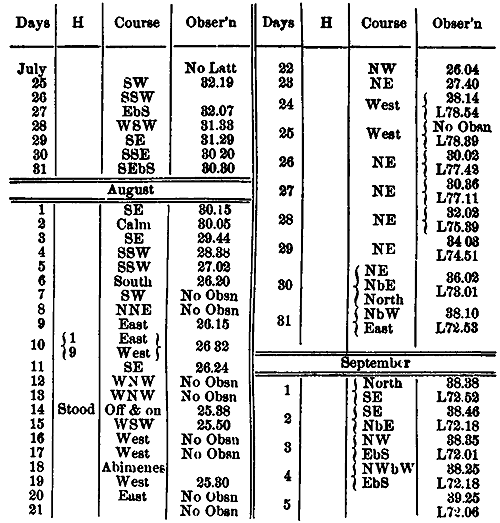
An Account of the Months, Days, & Knots the Ship Olvr Cromwell Run the Third Cruise.
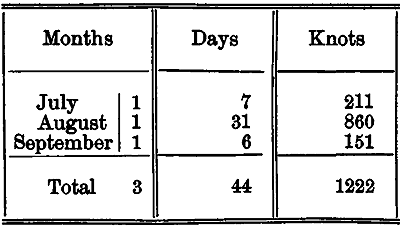
GUNNER’S REMARKS
REMARKS OF OUR GUNNER ON CHARLESTOWN, IN S. C
Charlestown is Pleasantly Situated on Ashley River on verry low Land it was Extreamly well Built but the Fire which happend in January last has Spoiled the Beauty of the Place, it may if times alter be as pleasant & Beautifull with Regard to ye Buildings as ever. But I Cannot Behold such a Number of my fellow beings (altho Differing in Complexion) Dragged from the Place of their Nativity, brought into a Country not to be taught the Principles of Religion & the Rights of Freeman, but to Be Slaves to Masters, who having Nothing but Interest in View without ever Weting their own Shoes, Drive these fellows to the Most Severe Services, I say I cannot behold these things without Pain. And Expressing my Sorrow that are Enlightend People, a People Professing Christianity Should treat any of God’s creatures in Such a Manner as I have Seen them treated Since my arrival at this Place. & I thank God who Gave me a Disposition to Prefer Freedom to Slavery.

